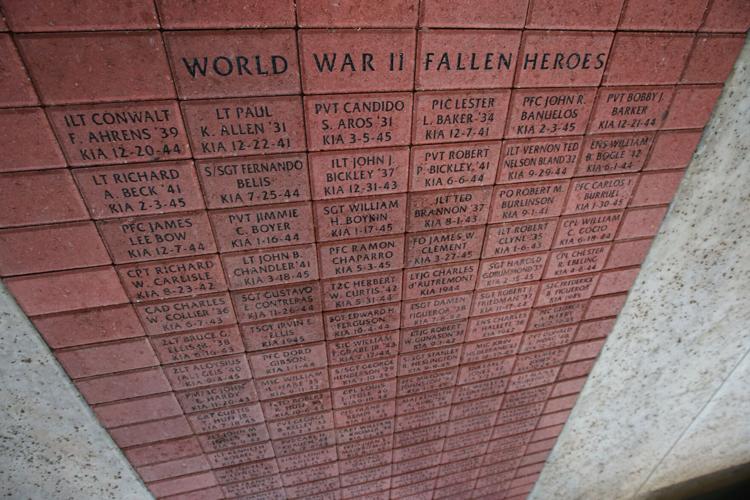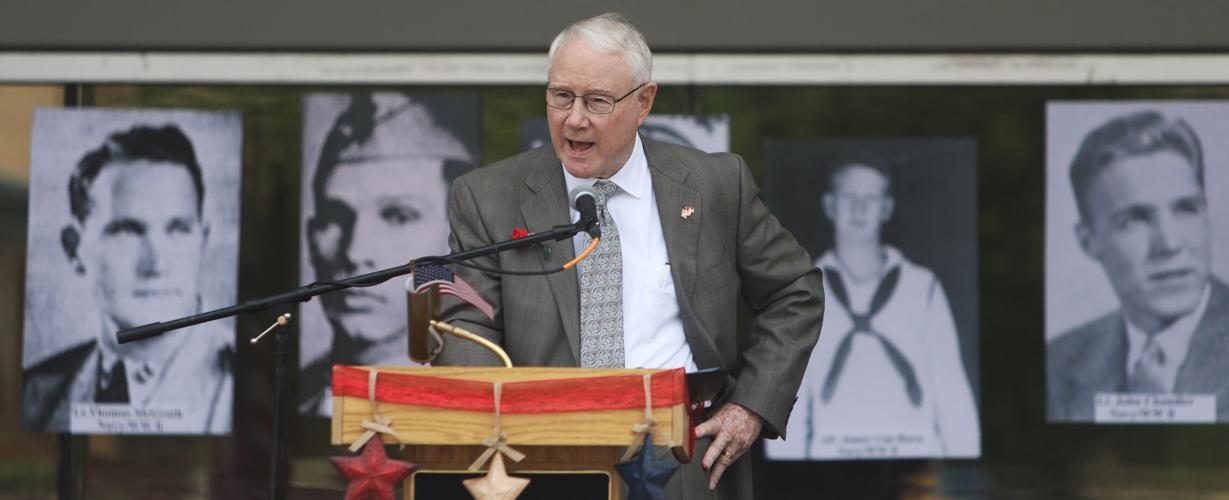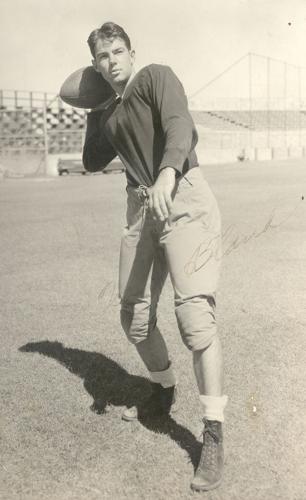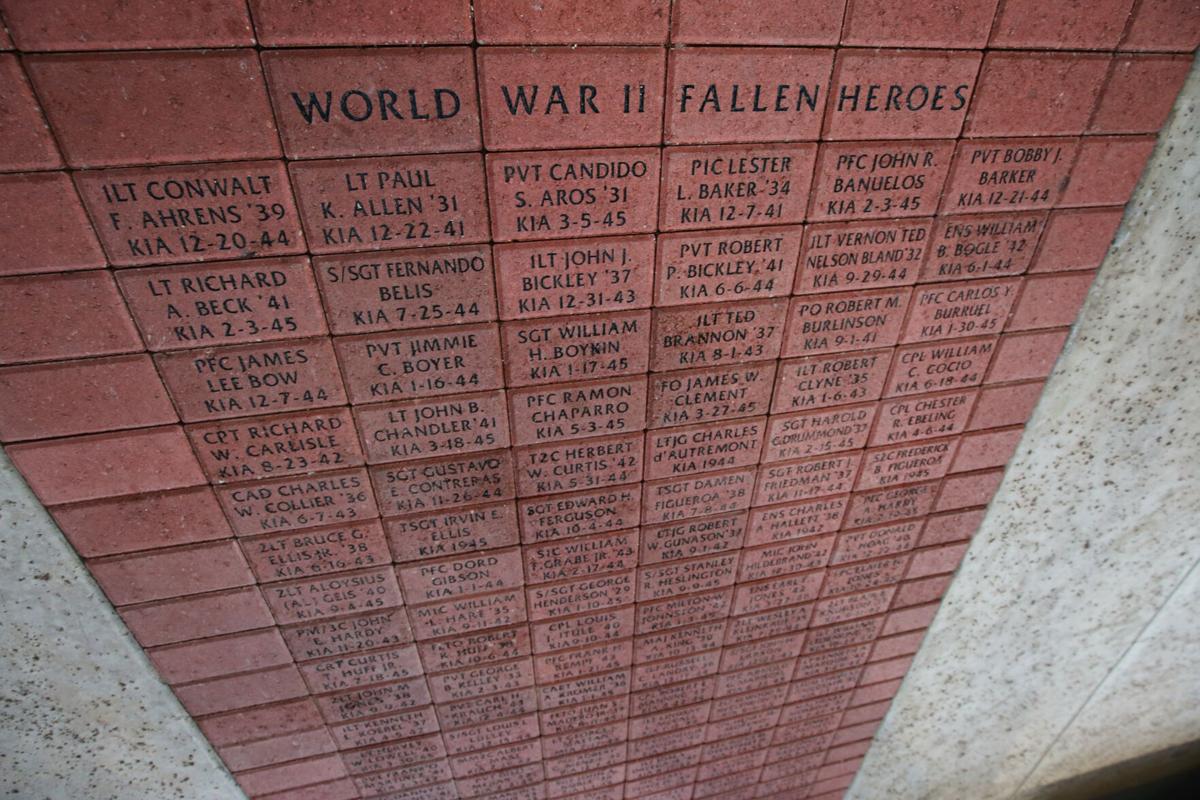Two men wearing military colors and holding bugles stood in a courtyard at Tucson High School’s Hall of Champions late Saturday afternoon. In a mournful harmony, they played “Taps.”
Sunglasses hid my tears, but as I looked at those around me — at those without sunglasses — I realized I wasn’t the only one touched by the sobering dedication of a brick pathway to honor 143 former THS students killed in World War II.
A dozen men and women, relatives of the 143 Badgers who had “KIA’’ etched into the bricks leading to the Hall of Champions, emotionally read the names of those killed in action.
Every few minutes I recognized the name of one of the 1930s and 1940s Badgers who helped contribute to two of the most successful decades of high school sports in Tucson history.
Ted Bland.
Corky Moore.
Frank Kempf.
Thomas McGrath.
In the previous 24 hours, I had read and listened to commentary describing Arizona’s struggling football team as “ignominious” and “shameful.” I had contributed to the dimension of such narrative by writing that the Wildcats’ loss to Washington created a sense of “hopelessness.”

Retired Col. Mike Butler, USMC, a former Tucson High basketball player, spoke Saturday at the ceremony to honor former 143 Badgers who were killed in action during World War II.
As I drove home, I wished I could turn the clock back and rewrite my column from Friday’s game. There is nothing hopeless about losing a football game.
Shameful? It’s not a word that should be associated with a football game, or any game.
As I sat in the afternoon shadows next to the THS Hall of Champions, listening to Col. Mike Butler — a key part of the Badgers’ undefeated 1962 state basketball championship team and retired Marine combat pilot — I was able to gain a more appropriate perspective on Arizona’s 19-game losing streak.
“I could’ve been killed in action 100 times,” Butler, a helicopter pilot who has been awarded a Distinguished Flying Cross and a Purple Heart, told me after the ceremony. “Who knows why I was spared and so many other young men were killed?”
A few days after the Japanese attacked Pearl Harbor, Dec. 7, 1941, my late father-in-law, Robert H. Keil, Tucson High Class of ’41, drove to San Diego with a group of 11 other Badgers athletes. They all enlisted in either the Navy or the Marines.
“Six of them were killed in action,” he told me a few years ago, sobbing. “They were barely 20 years old.”
My father-in-law, who enlisted in the Navy, was sunk by Japanese bombs on the night of Aug. 9, 1942, near Guadalcanal, killing 234 of his shipmates. Seriously injured, he was fortunate to grab onto a piece of debris and float in the ocean until an American search party found him 11 hours later.
He was the first to tell me about the names I heard again Saturday, the first to tell me how ex-Badger athletes Frank Kempf, Ted Bland, Thomas McGrath and Corky Moore had been killed in World War II.
Moore, a pitcher on THS’ 1941 and 1942 state championship baseball teams, was killed while attacking Japanese pillboxes — machine gun posts — at Iwo Jima. He planned to be a pitcher for Pop McKale’s Arizona baseball teams before the war took priority.
Bland was Tucson’s leading athlete of the 1930s, not only at THS but at the UA. He was Arizona’s first All-American football player. He was so good that his name was the first to be placed in the Ring of Honor at Arizona Stadium.
When Bland’s name was read during Saturday’s dedication, I thought about the telegram the War Department sent to his family. They lived a block from the Tucson High football field where he had become an All-State quarterback. Ted Bland was killed by a German sniper while serving in the infantry in France. He hoped to serve in the FBI when he returned from the war.

Ted Bland, who was killed by a German sniper while serving in the infantry in France in World War II, was Tucson’s leading athlete of the 1930s.
Each time I stand in Arizona Stadium and look at Bland’s name above the press box, next to those of Chuck Cecil and Art Luppino, I think not about his club’s then-historic 7-2-1 and 7-2 seasons with the “Blue Brigade” of 1934 and 1935, but about how much he sacrificed for this country.
Frank Kempf might’ve been the most dominant of all Tucson High baseball players during a streak of eight consecutive state championships, 1939-46. He was a three-time All-State catcher, captain of the Badgers’ undefeated 1943 team. He had pledged to play for McKale’s Wildcats after World War II.
But in February 1945, a few weeks after the Battle of the Bulge, Kempf was killed by the shell from a German mortar shell in Belgium. He would never play for Pop McKale or realize his dream of playing for the New York Yankees.
My father-in-law was fortunate to survive World War II. He returned to Tucson, got married, started a family, earned a degree from the UA and worked for McKale as a graduate assistant, helping to schedule games and coordinate housing for Wildcat football players.
He was one of the fortunate few.
When the name of Thomas McGrath was read Saturday, I thought of my father-in-law talking about McGrath playing football for the Badgers, a dominant lineman who accepted a scholarship to the Naval Academy after reaching the semifinals of the 1935 state playoffs.
“Tom was something of a legend, undefeated on the school’s boxing team,” my father-in-law said. “They still talked about him when I got to high school a year later.”
After surviving the Japanese attack on Pearl Harbor, McGrath, the executive officer on the Pompano, a submarine, was assigned to the dangerous waters near the Japanese coast. The Pompano was blown up by the Japanese in January 1944. McGrath’s body was never recovered.
Saturday afternoon, I stood next to the brick honoring McGrath outside THS’ Hall of Champions. I stared at the letters “KIA” and dabbed at the tears in my eyes.
Football never seemed so insignificant.







